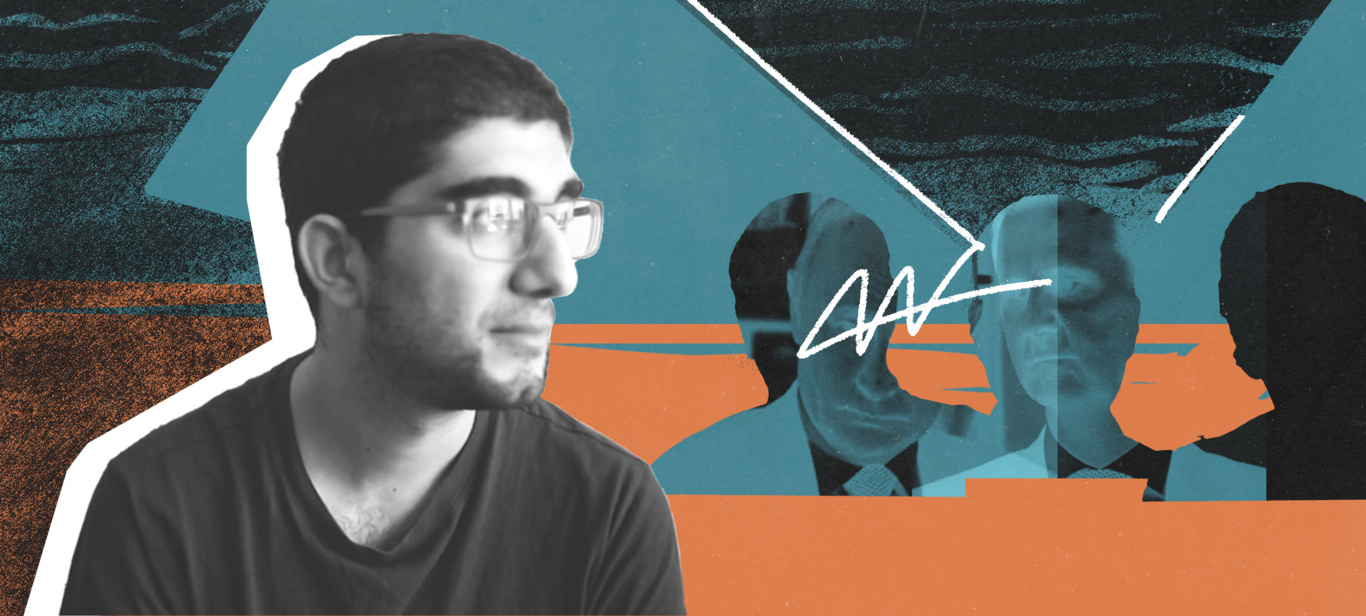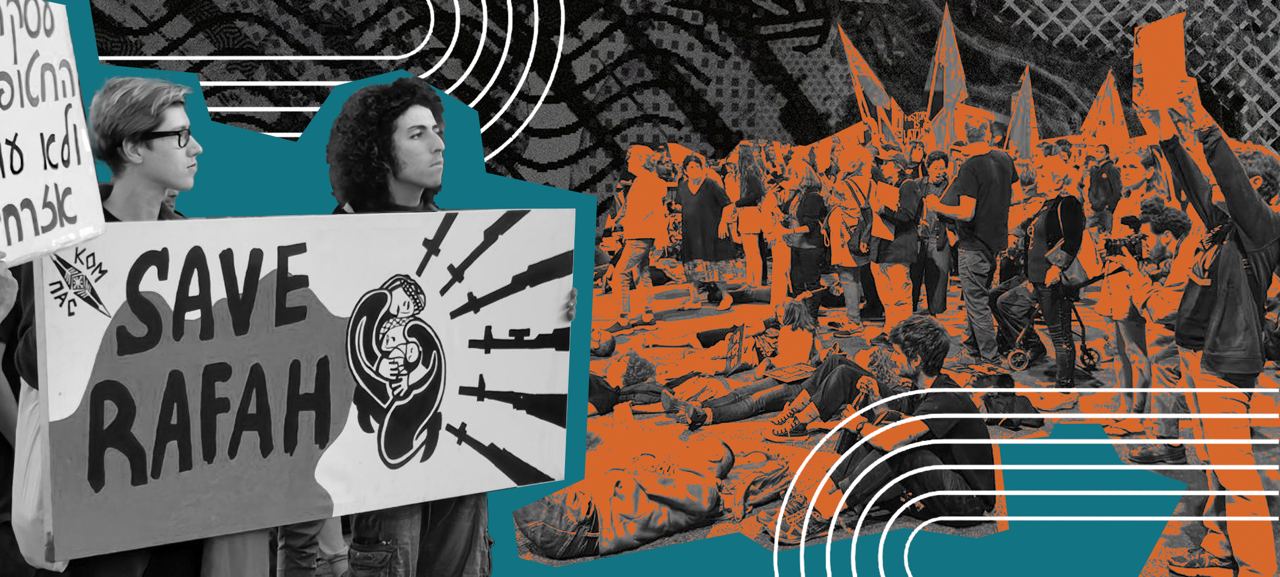Commons talked with Elia J. Ayoub, a writer, researcher, activist and podcaster from Lebanon. Throughout the last year and a half Elia invited Ukrainian activists to his podcast, took part in discussions about Russo-Ukrainian war and advocated rights of Ukrainians to resist on the international level, connecting Ukrainian struggle to struggles of other oppressed nations. In this interview he shares his optics on how anti-imperialist international solidarity is possible, what are the obstacles in developing it, explains the context of struggles of people from his region — Lebanese, Palestinians, Syrians, and explains why it is important to support Ukraine despite the contradictory civilisational approach of Ukrainian leaders.
Could you tell us about your path as a researcher and an activist?
Elia: I started off as an environmental researcher at the American University of Beirut about a decade ago. Then I moved to the field of cultural studies and cultural analysis. I did a Masters at the University of London in 2015-2016, and several days ago I finished my PhD from the University of Zurich. The thesis was on cinema in Lebanon, focusing on themes like memory, hauntings, trauma, futurities. Parallel to all of this I worked as a journalist, a writer, and an editor. When I was in Lebanon, I was very active and participated in street protests. But I left the country in 2015, so I moved my activism to the online sphere. I've been engaged in the podcast project since 2020 and on other forms of networking, putting people in touch with one another.
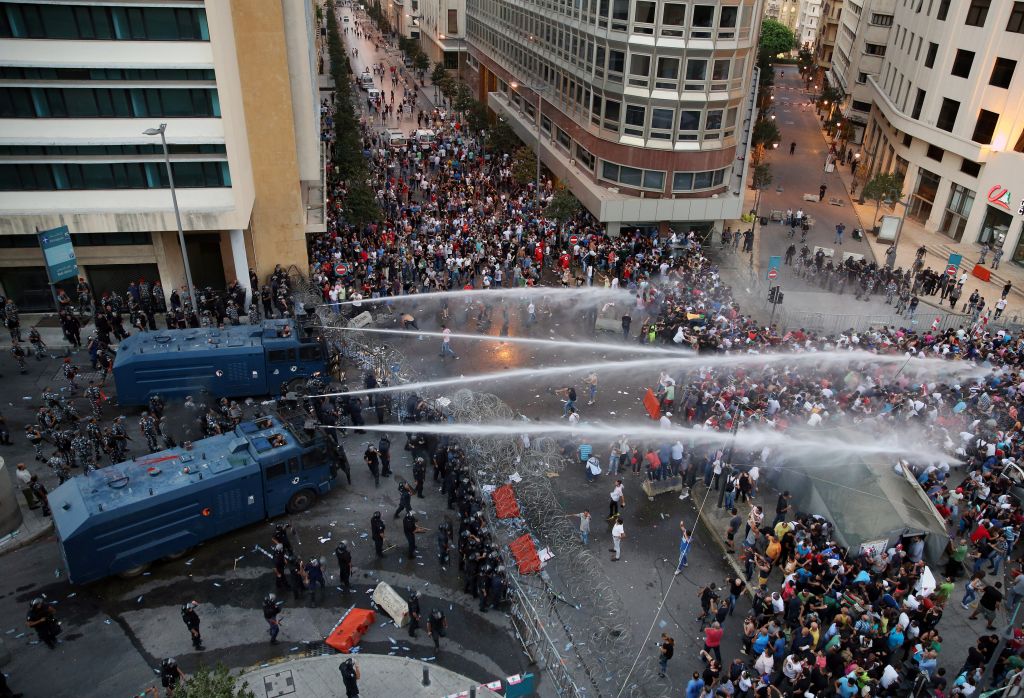
Policemen use water cannons to disperse an anti-government protest in Beirut, Lebanon, which broke out over problems with garbage removal. August 23, 2015. Photo: (AP/Bilal Hussein).
In your texts and podcasts you work on building solidarity between different struggles and movements. What are the main obstacles in this process? And which experiences of people, suffering from imperialist wars, do you find similar or interconnected?
Maybe this is a broad generalisation, but people usually find it easier to connect with one another if there's already something in common — cultural, regional, historical and so on. Or if they have a common enemy. This is quite widespread – whether it's right or wrong is another question. We see, for example, that Palestinians and Latin Americans often found a lot of things in common and connections were easily built because they had the US as an opponent. Syrians and Iranians declare solidarity with Ukraine, because they have Russia as a common enemy.
We have this “organic” sentiments of commonality that pop up. The shortcoming, obviously, is that sometimes if the enemy of my enemy is my friend, such “organic” sentiment can ruin the solidarity. We see this sometimes in Arab countries — not many, but some Arabs would whitewash Russia or even support Russia because they oppose the US. In such a way Ukraine is kind of erased in the whole story. And we see this with some Iranians in the diaspora, because they are against their government and Israel is against the Iranian government, so these Iranians side with Israel, erasing Palestinians. Unfortunately, these dynamics are not uncommon. I remember during the Hong Kong demonstrations, some people were supportive of Trump because Trump is against China.
But I want to focus specifically on Lebanon, Syria and Israel-Palestine, because that is what I know more about. I would say that here the main obstacles to solidarity are the social difficulties within those contexts. Lebanon is in an economic crisis. In Syria there are obviously multiple crises. There are multiple ways in which people kind of adapt to that situation of constant crisis. Most people, even if they think about other countries from time to time, really don't have much of a luxury to think about them too much. The majority are not sympathetic with the Russian state, for example, but at the same time they might perceive it as something which is too far away. Sometimes this can lead to cynicism and end up in conspiracy theories. But the root of this attitude is not necessarily personal, though some Arabs have a personal connection to Russia due to Soviet history — some of them studied in the Soviet Union. But people in their 30s, 40s and under, don't have that personal connection — and it's more about either cynicism or maybe apathy or just despair and feeling like nothing matters. It's more a result of despair, a result of not being even able to take in too much suffering and trauma, and death, and pain – because there's so much around you already. And this is especially true about Palestinians, much more than Syrians, who have that added layer of commonality with Ukrainians, which is that they have the Russian state as a common enemy. In this sense, building solidarity bonds between Ukrainians and Syrians may be easier than between Ukrainians and Palestinians, but not impossible (I am also Palestinian, I should say).
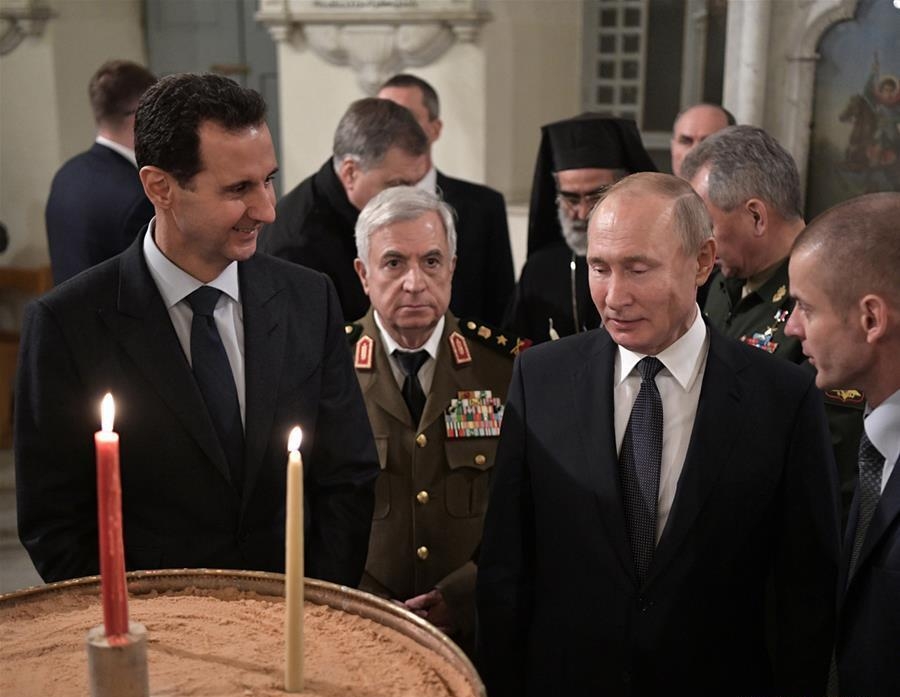
Syrian President Bashar al-Assad and Russian President Volodymyr Putin visit an Orthodox church in Damascus, Syria, January 7, 2020. Photo: Xinhua.
I would like to discuss how we could overcome such obstacles later, but before that I want to ask about your experience with Ukrainian activists. After the start of the Russian invasion, you interviewed several Ukrainians on your podcast and moderated a discussion between Ukrainian and Syrian activists. What was new or especially interesting in sharing experiences with Ukrainian activists?
Actually, that was very similar to my experience talking to Hong Kongers, Taiwanese and Iranians. But there are differences, of course. For example, Hong Kong activists see their struggle as one that has been defeated in 2019, because the Chinese state cracked down on them back then and then in 2020 it got worse. So there is this sense of finality, of survival mode: they are focusing on what comes after the defeat, for example, trying to build some alternative in the diaspora in the hope that it will affect things back home. Whereas with Ukrainians there is “nothing after the defeat”, because now they're fighting to make sure that there is no defeat. I found, actually, that there is something similar with Taiwanese. Russia and China are allies, so many Taiwanese looking at Ukraine have a sense that something might come next towards them. This gives an easier way of empathising, of linking them with Ukrainian struggles.
Also my experience with Ukrainians has been that it is easier to talk about Syria and Iran than it's been before. Since the annexation of Crimea happened roughly around the same time as Russia's intervention in Syria, there was a way of building links. At the same time, it's not necessarily easy to talk with Ukrainians about Palestinians and it's not always the other way around for that matter. It doesn't mean that it's impossible. It's more like “yeah, what can we do?” I see the same with Palestinians when we talk about Syria. Again, I'm generalising of course. You will have many Palestinians who hate the Assad regime and hate Iran because they see them as brutal states, but it's like “well, what can we do, there's no one else supporting us” kind of attitude. And this is what I mean by the cynicism or despair of “the enemy of my enemy ismy friend” kind of framework.
We see this kind of attitude among Ukrainians as well, towards, for example, Armenians or Palestinians. Palestinians are a bit different, because Israel isn't necessarily pro-Ukrainian, it's more ambivalent. But we definitely see this with Armenians, because Armenia is seen as being on the side of Russia, and Azerbaijan is giving weapons to Ukraine. And therefore there is this “enemy of my enemy is my friend” framework. That is understandable during a battle or a war, but can be also damaging. Because Azerbaijan is a very violent state (and so is Turkey for that matter, notably towards Kurds). But the victims are different, Azerbaijan's victims are Armenians , and so it's difficult to create understanding between victims of different states. Many focus on what's happening in their country and put aside what's happening elsewhere. It's very hard to maintain a balance, especially if you are currently under bombs in a war situation like Armenians in Nagorno-Karabakh or Ukrainians in Ukraine. It's difficult to think beyond the immediate, when you need to defeat your enemy, because he is threatening your life. It's understandable. Unfortunately, big powers tend to be aware of this and are able to cynically use this to their advantage.
Let’s move to the question that would help us to understand the Lebanese experience from the point of view of a Ukrainian. Wars Lebanese people experience throughout the last decades are often presented as Iran-Israel proxy conflict. Would you say that it is as far from reality as seeing the Russo-Ukrainian war as just a conflict between NATO and Russia? What is behind such sort of frameworks?
I would say that it's even less accurate to say that the Russo-Ukrainian war is a proxy war between NATO and Russia than it is to say that the conflicts in Lebanon were proxies between Israel and Iran. Even though in Lebanon that's not accurate either, it's closer to reality than it is in the case of Ukraine.
When Israel invaded Lebanon in 1982, and then stayed in southern Lebanon until 2000, Iran's role was to oppose that occupation, but largely by fueling and funding Hezbollah, which ended up crushing the existing resistance against Israel. There was an active resistance in 1982 that was largely secular — nationalist, communists, pan-Arabists, and Palestinian groups were all allied. Iran's priority was to create its own alternative, so they ended up effectively creating Hezbollah in order to have their own way within the resistance and essentially establish some kind of political influence within Lebanon, which, of course, they continue to have to this day.
But Israel's role in Lebanon has been to try and establish some kind of “affiliation”, especially with right-wing Christians, but that collapsed in 2000 with the liberation of South Lebanon. They don't really have any kind of significant political hold in Lebanon today anymore. You have some people who are sympathizers here and there, but it's very small and they no longer have any direct influence on the political scene in Lebanon. That being said, Israel routinely violates Lebanese airspace, often to bomb its ennemies in Syria, and there is always the specter of an another war between Israel and Hezbollah, which obviously greatly impacts Lebanon.
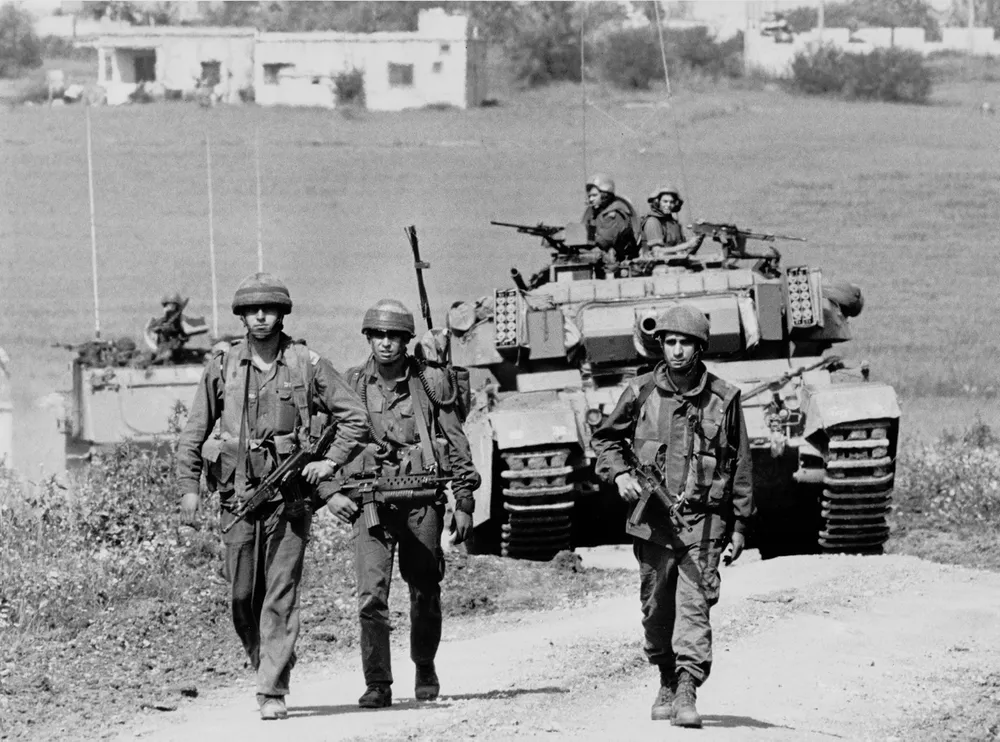
Israeli soldiers in Jezzine, Lebanon, during the First Lebanon War, 1984. Photo by Moshe Shai/FLASH90.
There used to be more of a proxy between Iran and Saudi Arabia, and Israel was sort of more on the Saudi side, but very discreetly. But even that died out in the past decade, because Iran was much more involved in Syria (and Iraq) than the Saudis were willing to be. And the Saudis withdrew a bit from the region to focus on Yemen, for example, because that was their geopolitical priorities. And then recently they've renormalized relations with Iran anyway. So I would no longer describe things in Lebanon as a proxy conflict. That can always change, of course.
This description of the events in Lebanon as a proxy conflict was accurate during the civil war to a certain extent, depending on when and where, but broadly speaking, it was at least part of the picture. Recently, the establishment, the ruling class, the sectarian elites, as we call them in Lebanon, some of them have affiliations with Iran, some of them have affiliations with Saudi Arabia, some of them have affiliations with the West. But, in terms of concrete politics, the differences between them are not very large. And that's why during the 2019 uprising, the chant was “All of them means all of them”. That was a very conscious decision by protesters, because those foreign influences had much more in common with one another.
So the comparison with Ukraine doesn't really work because Ukraine is very concretely being invaded and occupied by a pretty openly genocidal, fascistic and imperialist power. There is no equivalent of that in Lebanon, even when Israel and Syria were occupying at the same time: Israel was occupying the South and Syria was occupying the rest of the country until 2000 and 2005 respectively. There was no plan of turning the Lebanese into Syrians. Like what Russia is saying: “Ukrainians don't even exist”. Israel was not saying that the Lebanese don't exist, and neither was Syria. They just wanted to have their share of the pie, so to speak. They wanted to control politically what they viewed as a priority, but the Lebanese identity was not a priority for them. I would say that Israel’s priority was more the Palestinian identity that it has been trying to erase for since 1948. But when it comes to the Lebanese identity, they don't really care that much.
Historically, the region was broadly referred to as Syria or Syria-Palestine, or the Levant, because states didn't exist. But with the advent of the modern state the line between today's Lebanon and Syria was formalized, as was the line between Palestine and the other two. When Syria invaded Lebanon, for example, there was resistance against that as well. Now it's politically unlikely for a full-scale invasion to happen again. And so Syria has already lost, as Israel already lost two decades ago. It's just not feasible politically anymore.
Anti-imperialism in Ukraine is definitely anti-Russian imperialism for obvious reasons, but parallel to this there are also some anti-Western critical narratives. Such as viewing NATO countries as an ally with his own interest, but useful for us now, or as an ally who does not do what she promised (supplies weapons slowly). Do you think there is a chance to build bridges between such anti-imperialist senses internationally, taking into account that local movements might seek support (like, supply of weapons in case of Ukraine) from different imperialist countries? And how to build these bridges?
Everything is possible, but it's useful to identify what are the obstacles to make that possible. It is true that Ukrainians right now, in order to resist Russia, have to depend on not just Western weapons, but whatever weapons come their way. That's just the reality of war. And in and of itself, this is not unique. This has always been the case. I think of the Spanish Civil War, where at some point the anarchists and the communists were asking for weapons from France and the British Empire, and Stalin's Soviet Union. Yes, that ended up badly for them. When the Spanish and Catalan resistance was defeated by Franco, eight months later Stalin and Hitler signed the Ribbentrop-Molotov Pact and invaded Poland together. It was very clear to the anarchists that Stalin was not an ally, but they desperately needed weapons, so they accepted. But that was like a situation in which people who were fighting Franco and fighting fascism had to accept weapons from anywhere including weapons from the British and French Empires that were oppressing colonized peoples all over the world, from India to Algeria.
Another example I always give is that the Nazis were defeated by three empires: by the Brits, by the French, and the Soviets. France was no longer an empire legally, but in terms of colonial crimes let's remember that Algeria wasn't liberated until 1962. The Brits were still committing crimes in India, and India didn't become independent until 1947. But the fact that the Brits, the Soviets, and the French were not perfect did not mean that it was not right to support the allies' effort against the Nazis — because the Nazis were Nazis. There is that very concrete pragmatism that one has to have in the moment. People who are not in those situations should have a bit of an understanding. Wars are very messy and very complicated, and people who are on the ground can't necessarily afford to have ideals. Or maybe they have ideals, but they have to put some ideals aside because they have concrete things to prioritise.
This is the same in southern Lebanon when there was the occupation by Israel. Many people who were crushed by Hezbollah ended up having to tacitly agree that Hezbollah became the main game in town, and the main ones fighting against Israel. This included, for example, communists who were assassinated by Hezbollah but then had to support or at the very least tolerate Hezbollah — because the common enemy was Israeli occupation.
Depending on foreign powers — that you may or may not like — for weapons or finance is not new, because you have monopolies of power, monopolies of weapons by NATO, Russia, China and so on. If you're from Taiwan you're not gonna get weapons from Russia and China, so you might get it from the US. You had the reverse: you had nations in Africa and in Latin America using support from the Soviets, because they viewed the Americans as their primary enemy. Cuba is a common famous example, but there were many more. And this does not mean that the Soviets were good. But what else are these nations going to do? Do-it-yourself weaponry? Often what would actually happen is that the Soviets — as today with the Americans — would not send their most up-to-date weapons, they would send what's already used or outdated, they would always have limits.
War planes in Ukraine are an obvious example. In Syria, it was anti-aircraft weaponry, which Ukrainians did get — which is good. But Syrians did not get it, because Obama was actually very explicit in saying that we cannot give them anti-aircraft weaponry, because at some point they may use them against us. They did not trust Syrians. This where islamophobia and racism, all of those things come into play, and there was also no guarantee that if the revolution in Syria wins, they will be friendly to Israel.
The Americans' priority was Israel, not Syria. But if you are a Ukrainian on the ground, or if you are a Syrian on the ground, or a Palestinian in Gaza, you have to make some decisions. Palestinians in Gaza have had to tolerate Hamas, even though Hamas is very unpopular, it just is. But what do they do? There's nothing else that can be done in that situation. It's very easy to blame them and to say they're all terrorists, because otherwise you will have to recognize that it's a complicated situation and people have to do what they can do on the spot.
I think there are ways of having both a pragmatic approach and also recognizing that this is not our ideal approach. Many Ukrainians don't like the fact that the Armenian state is on 'the side' of Russia, although it's closer to Armenia being a geopolitical prisoner of Russia. And it seems to me that the Armenians are a bit stuck because there is Turkey that they have to worry about, and there is Azerbaijan that they have to worry about, and the West is on the side of Azerbaijan and Turkey. Therefore the only thing that they can do is to depend on Russia which, to be honest, is not a great ally to have. And many of them know this. Just look at Nagorno-Karabakh: Azerbaijan set up a military checkpoint there despite Russia's so-called 'peacekeepers'. So either Russia has not done its job well, or Putin and his entourage have concluded that they prefer having Armenia as a hostage. Armenia looks like it put all of its eggs in a Russian basket, but it's important to ask what are Armenians' actual options? Turkey, the country that committed the Armenian genocide which it continues to deny, is a part of NATO. Azerbaijan regularly uses very openly genocidal language against Armenians, and Azerbaijan is clearly a Western ally. What does one do in such a situation? Basically, they go with whatever support is there. I'm not talking about the state, but about just ordinary people. As far as I understand it, Armenians wouldn't exclude leaving Russia's 'sphere of influence', but who is giving them that option?
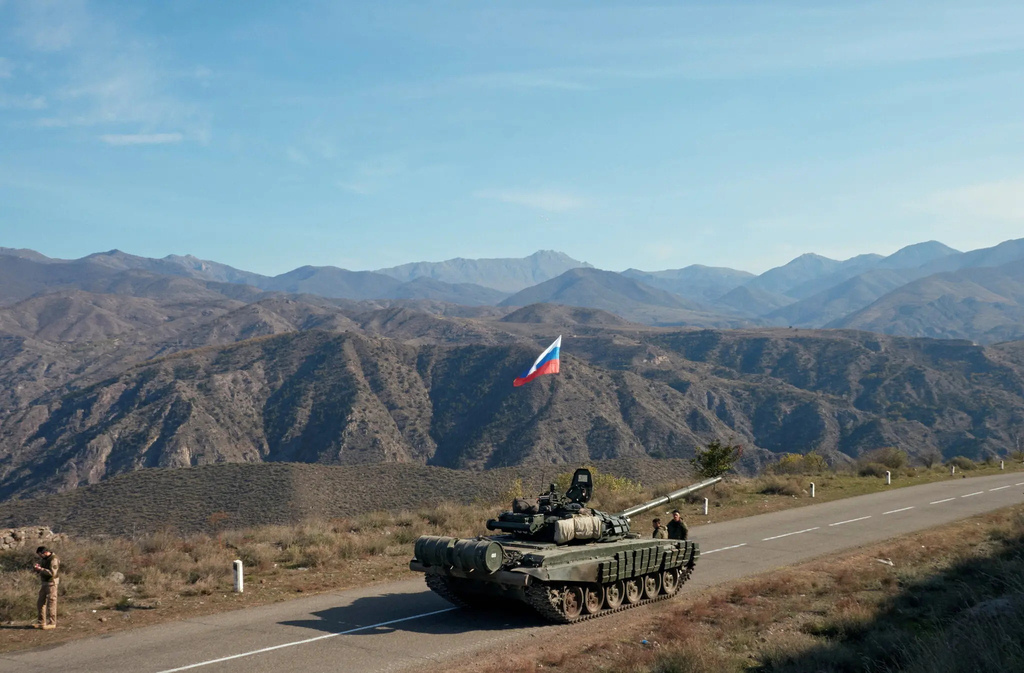
Russian troops near the border with Armenia during the escalation of the conflict between Azerbaijan and Armenia over Nagorno-Karabakh. November 2020. Photo: Francesco Brembati/Reuters.
I understand that many Ukrainians believe that Turkey or at least Azerbaijan is on their side. I don't think this is true, but I understand why at the moment this can be believed to be the case — because there is a wider enemy that is just much more threatening and dangerous. I don't like the fact that Ukraine has to depend on the West, but I understand it because countries like Lebanon cannot or will not send Ukraine weapons. There's no Global South coalition, like Latin Americans and Africans and Asians, excluding China, coming together and say we're going to support Ukraine. That hasn't happened. What comes with it, the rhetoric “We are western, we're civilized, unlike those others”, of course, is very problematic. But we need to be able to decouple those two, because an existential crisis — the fact that Russia is very explicit in wanting to erase Ukraine from existence — has to be a priority.
There is a hope that the weakening of Russia in the process of Russo-Ukrainian war could weaken Assad’s regime and change the direction of the war in Syria. Do you think it is a probable scenario? At the same time we see that Asad establishes connections with other Arab countries lately. Do you think it is a dangerous process?
Assad is extremely dependent on Russia, even more than Iran. And that's probably why his regime has been trying to get back to the Arab League to have some kind of safety net. I'm not sure that this is gonna be enough for him. The Arab League wouldn’t risk it if Assad is being killed or being toppled. I don't really see Saudis sending troops into Syria to stop it. Maybe I'm wrong, but I don't see that as being a serious possibility, to be honest. I do think that Russia is weakening, and it seems to be a question of “when” rather than an “if” at this point, as we saw with the recent mutiny attempted by the Wagner group.
Fingers crossed
You're saying this and many Syrians are doing the same. The Assad regime almost collapsed in 2012. In order to prevent its collapse, Assad asked for regional forces to come and support him. And this was especially Hezbollah first, and then Iran, but Hezbollah through Iran, and then Iran properly in 2013 and then 2014. And then, of course, Russia in 2015. The regime almost collapsed in 2012. Then it almost collapsed despite Iranian support in 2014. And then it needed Russia in order not to collapse. The collaps was prevented only because of the Russian air force. That's why Syrians were asking for anti-aircraft weaponry, because a vast majority of the deaths were from the air. The West just refused to give them.
Without the support of Russia, the Assad regime may collapse. And here I want to be careful. I do not expect that everything is gonna be fine by itself. We don't know if Russia falls down into some kind of civil war. It's like Pandora's box opening up. We have no idea what comes out of this. There are worst case scenarios that involve nukes and you have best case scenarios that do not. But when it comes to Syria, it is very difficult to imagine how anything can be worse than Assad. If he falls, tens of thousands if not hundreds of thousands of people will be released from prisons. The vast majority of them are just civilians who were captured by the Assad regime and tortured and killed. A lot of people have relatives that have been waiting for them for almost a decade. What happens after I have no idea, but there is a domino effect — it may be not just Assad collapse, but the Iranian regime also.
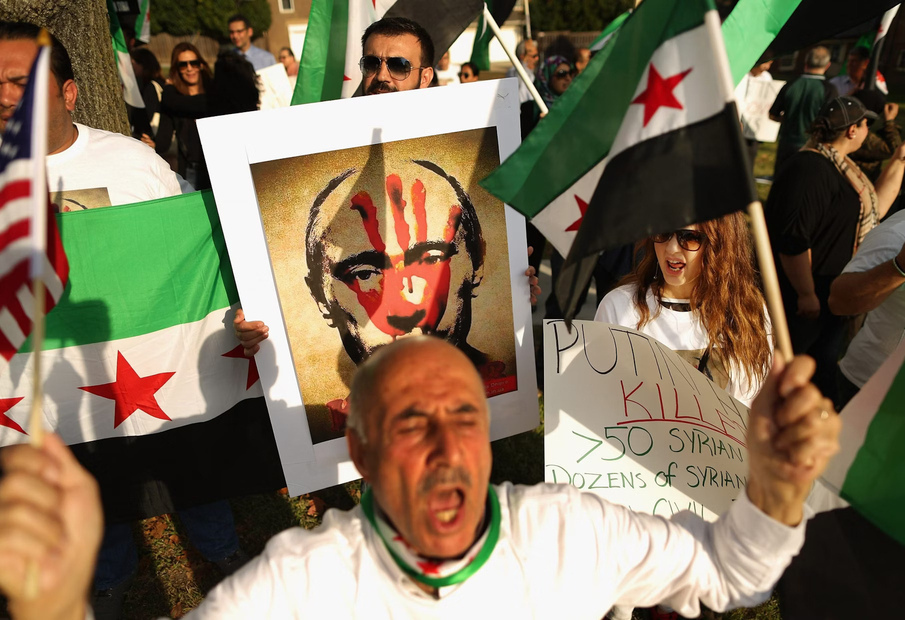
Protest against the Russian invasion of Ukraine in Syria, May 2022. Photo: The Century Foundation.
I don't know how stable the Iranian regime is at this point, especially given what the uprising we saw in 2022. And then with Lebanon there is another layer — Hezbollah is the strongest party in Lebanon right now, but by no means is it the only party. Some of them are “allies”, but not on amazingly friendly terms with Hezbollah. That might be an advantage if Hezbollah starts being weakened because Iran is weakened. And you have Israel as the completely different side of the equation. There are all of those different factors. But if you are a Syrian who hates Assad for various obvious reasons, you are paying very close attention to what's happening in Ukraine – even arguably more attention than to what's happening in Syria, because that's how consequential it may be.
Here it is important to remember that while Prigozhin tried to organise a coup in Russia and then failed, at the same time Russia was bombing Syria. They even bombed an animal shelter in Aleppo. So it's very clear that even if the Russian regime is threatened internally, it might take a lot before it removes all of its troops from “strategic locations”. Although we have seen Wagner people being taken away from Libya, the Central African Republic and other places in order to fight in Ukraine, which shows already that the Ukrainian resistance has been putting a far higher toll on Russia than Russia was expecting initially. At some point it might extend to withdrawing the air force from Syria. And if that's the case, Assad is in trouble. So, yes, fingers crossed.
After the invasion started one of the narratives in Ukraine has been that one of the long-term pre-conditions of the invasion is that the international community, as well as we, Ukrainians, did not care about Georgia, Syria, Sudan or the Central African Republic where the Wagner group committed multiple war crimes. I do agree with the idea, but at the same time I would like to ask you: What does it mean to care? What would you tell to Ukrainians who want to care about Syria, Lebanon, Palestine?
It's not unusual. The average Lebanese knows more about Iran or Israel, not because they want to — maybe they would prefer to think about Latin America. But Israel, Iran, Syria, the US, Saudis have been more consequential in Lebanon, and because of that more Lebanese have had the opportunity to become more familiar with those states. That doesn't mean that a Lebanese would not care about a Taiwanese or a Congolese. It just means that there is some work to be done to create bonds and networks that maybe did not exist before. I think that the main weakness of — for lack of a better term — the internationalist activist community is that for the most part we are on the reactive side of things. We react to events which are already very hard to ignore, like Russia invading Ukraine. Ukrainians can now learn more about the Central African Republic or Syria, because of the Wagner group. But there should be a way of learning about different contexts without needing a militia like Wagner, or a state like Russia, or China, or America for that matter. Though there are going to be lots of mistakes and shortcomings, there should be ways and we can create those ways.
